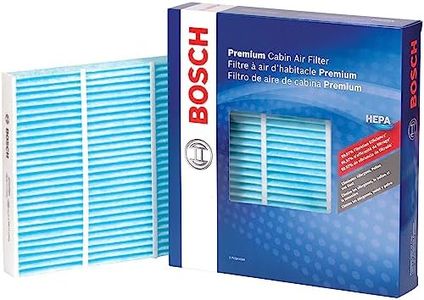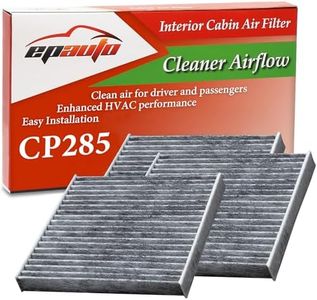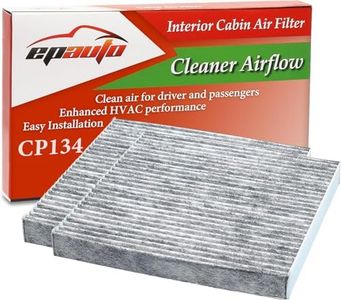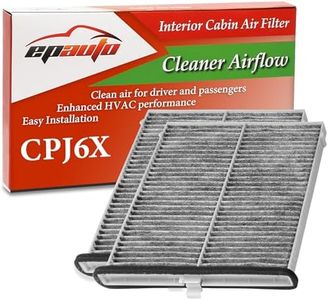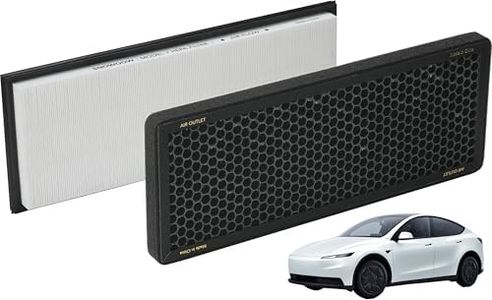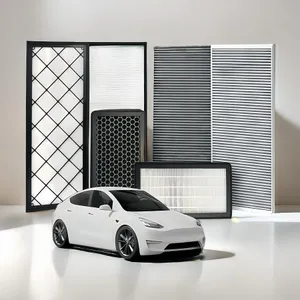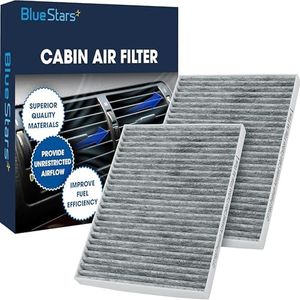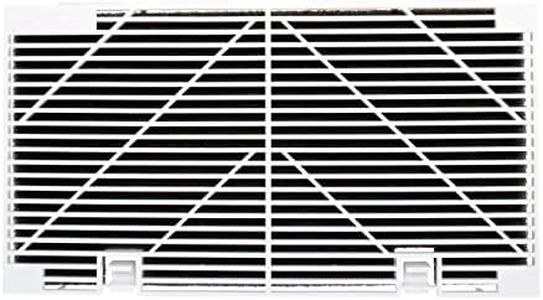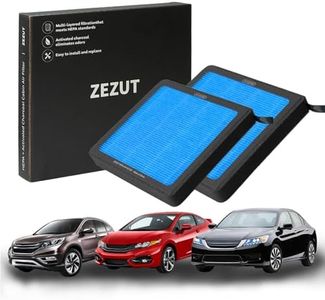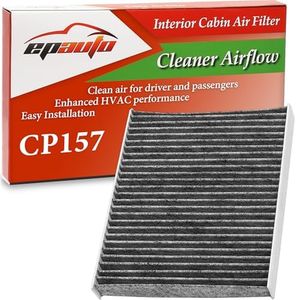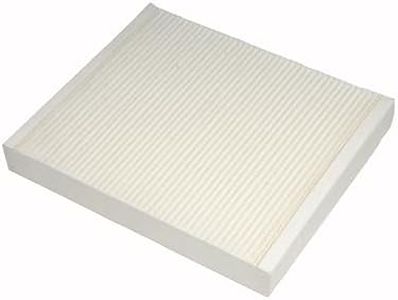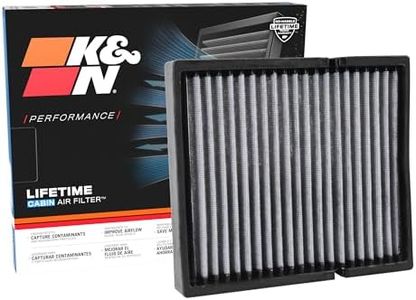10 Best Cabin Air Filters 2026 in the United States
Our technology thoroughly searches through the online shopping world, reviewing hundreds of sites. We then process and analyze this information, updating in real-time to bring you the latest top-rated products. This way, you always get the best and most current options available.

Our Top Picks
Winner
BOSCH 6055C HEPA Cabin Air Filter - Compatible with Select Lexus ES, GS, GX, IS, LS, RX; Subaru Legacy, Outback; Toyota 4Runner, Camry, Corolla, Highlander, Prius, RAV4, Sequoia, Sienna, Tundra + More
Most important from
6587 reviews
The BOSCH 6055C HEPA Cabin Air Filter delivers impressive filtration efficiency, capturing 99.97% of particles as small as 0.3 microns. This means it does a great job at keeping your vehicle's air clean and free from allergens and pollutants, which is particularly beneficial for families or individuals with respiratory issues. The filter features a multi-layer design, including a melt-blown electrostatic layer and a static cotton layer, enhancing its capacity to trap dirt and debris effectively. Its structural ribs add to its durability, ensuring the filter maintains its integrity over time.
Compatibility is a strong point, as this filter fits a wide range of Lexus, Toyota, Subaru, and Scion models, making it a versatile choice for many vehicle owners. Users appreciate the lack of chemical odors, making it a more natural option for maintaining air quality inside the car.
A couple of downsides to consider are the need for regular replacement every 12 months or 12,000 miles, which could be inconvenient for some. Additionally, the fit might vary based on specific vehicle trim levels, so users must verify fitment details, which could be a hassle for those unfamiliar with vehicle specifications. Lastly, while it has a high customer rating, the price point may be higher than some budget-friendly competitors, though many users find the quality justifies the expense.
Most important from
6587 reviews
EPAuto CP285 (CF10285) Premium Cabin Air Filter includes Activated Carbon, 3 Packs
Most important from
44068 reviews
The EPAuto CP285 Premium Cabin Air Filter comes as a 3-pack and is designed to improve the air quality inside your vehicle by filtering out dust, pollen, and odors thanks to its activated carbon layer. This feature helps to reduce unpleasant smells and some harmful gases, making it a good choice if you want fresher air while driving. It’s compatible with many popular Toyota, Lexus, Subaru, Jaguar, Land Rover, and Ford models, which means it fits a wide range of vehicles well. The filter is sized to match original equipment manufacturer (OEM) specifications, ensuring a proper fit and maintaining good airflow through your car's ventilation system.
Speaking of airflow, it is designed to restrict airflow as little as possible, which helps your heating and cooling system work efficiently without strain. Filtration efficiency is solid for everyday driving needs, capturing common allergens and contaminants, though it may not block the tiniest particles like some premium filters designed for highly polluted environments. The recommended replacement interval is about every 12 months or 12,000 miles, which is typical and helps keep the filter working effectively without becoming clogged.
This filter is a reliable, cost-effective option for refreshing your car’s cabin air and maintaining HVAC performance for a wide variety of vehicles. It is important to double-check compatibility before buying since it is specifically made for certain vehicle models. Additionally, if you are particularly sensitive to pollution or drive in extremely dusty or smoky areas, you might want to consider a filter with higher filtration efficiency.
Most important from
44068 reviews
EPAuto CP134 (CF10134) Premium Cabin Air Filter includes Activated Carbon, 2 Packs
Most important from
35287 reviews
The EPAuto CP134 Premium Cabin Air Filter comes as a two-pack and is designed to fit a wide range of Acura and Honda models, making it a solid choice if you own one of these vehicles. It uses activated carbon to help filter out pollutants and odors, which improves the air quality inside your car and keeps the cabin smelling fresh. This filter is made of paper material and supports better HVAC system performance by maintaining airflow, so it shouldn’t overly restrict air circulation while keeping contaminants out.
Its size and thickness are tailored to match OEM standards, ensuring a proper fit for the specified vehicles. Users should expect to replace it about once every 12 months or 12,000 miles to maintain optimal air quality and system efficiency. Many buyers highlight the easy installation and effective filtration, reflected in its high customer rating.
Since it’s a specific fit for certain Acura and Honda models, it’s not suitable for all cars. Also, while the activated carbon helps with odors, this type of filter might not capture the tiniest particles like some high-end HEPA filters do. For drivers of compatible Honda or Acura vehicles seeking a reasonably priced, efficient cabin air filter that improves air freshness and protects the HVAC system, the EPAuto CP134 is a dependable option.
Most important from
35287 reviews
Buying Guide for the Best Cabin Air Filters
Choosing the right cabin air filter for your vehicle is essential for maintaining a clean and healthy environment inside your car. A good cabin air filter can help remove dust, pollen, and other airborne contaminants, ensuring that the air you breathe is fresh and clean. When selecting a cabin air filter, it's important to consider several key specifications to ensure you get the best fit for your needs. Here are the key specs to look out for and how to navigate them.FAQ
Most Popular Categories Right Now
